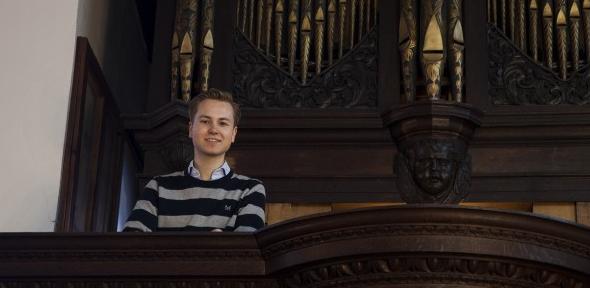
He learnt to play the organ as a child and developed a keen ear for languages. Now Dutch master’s student Geerten Boonzaaijer unwinds from the demands of economics classes by practising the organ at Christ’s College.
He also works with a student initiative that offers free consultancy to enterprises in developing countries.
The organ can whisper but it can also thunder. When I was young I learnt to play the organ in my local church in the Netherlands. I couldn’t reach the pedals, only the keyboards. In Cambridge, I often pop into one of the college chapels to attend evensong. I’m able to book time to practise the organ too. Music clears my mind.
Brexit, the rise of populism, the aftermath of the credit crisis and now Trump. It’s an exciting time to be doing an MPhil in economics. The one-year programme at Cambridge packs a lot in. We get rigorous economic training, while never losing the connection with the real world.
We take eight modules and write a dissertation. We don’t write essays but we do a lot of maths. We’re given scenarios and models, and have to work out the answers.
From an early age I was aware that there was a world beyond the Netherlands. I’m the oldest of six children and on Sunday afternoons, my dad would use a projector to show us photos of the places he visited. His pictures would take us to the USA, Canada, Malaysia and the Middle East.
Home is a village on the edge of a forest. We went to a local primary school. From there I went to a high school where we learned English, French and German — and also Latin and Greek. I loved almost all my subjects but especially economics, history, mathematics and English. At the University of Rotterdam I took degrees in law and economics.
My interest in economics came from my teacher at high school. She used current affairs as a starting point and in the classroom we did lots of experiments — for example buying and selling things and looking at what happened when prices changed. She showed us how economics overlaps with many other subjects.
I’m a member of Christ’s College. We have formal dinners in a hall that dates from the early 16th century. It’s amazing to think that Christ’s is where John Milton, Charles Darwin and various Nobel Prize winners lived and studied. Many of the economists whose theories influence economics to this day were affiliated with the university. They include Keynes, Marshall, Pigou, Sen and Meade.
The collegiate system is great. College provides a brilliant way to make new friends and an opportunity to talk to people doing lots of different things. I’ve had some amazing conversations over dinner. You could spend all your time working but it’s important to get out and meet people and experience the unique environment that Cambridge is.
I joined a group called Bridges for Enterprises. I came across them at the Fresher’s Fair where hundreds of student societies have stands. Bridges for Enterprises connect start-ups in developing countries with consultants willing to offer help and advice for free. I am the strategic director and I’m helping them to think about how they can develop to become fit for the future.
Like the Netherlands, Cambridge is full of bicycles — so it feels familiar. When I went to Shanghai on an internship, I cycled to work. Most people go on the metro which is jam-packed. Generally, only poor people travel by bike. They were surprised to see a tall, blond guy cycling with them — especially when I cycled with no hands.
I’d like to see more of the world. During my degree I spent five months at the University of Pretoria in South Africa. I was shocked by the gap between rich and poor. Travelling around the country I saw how little integration there is between whites and blacks. Apartheid was abolished but segregation continues.
When I graduate I plan to get some real life experience. I’d like to work in a role that combines law and economics, ideally for a large company. Later in my career, I want to use my skills to contribute to society — whether it’s in the public sector, helping to make the economy more resilient, or in the private sector, helping to maintain a level playing field for competing firms.
Because English is a global language, it’s vital for many careers. But my love of words goes deeper than the need to learn it. At Cambridge I’m taking every opportunity to talk to native speakers and extend my vocabulary. Behind each word is a story.
This profile is part of our This Cambridge Life series.
